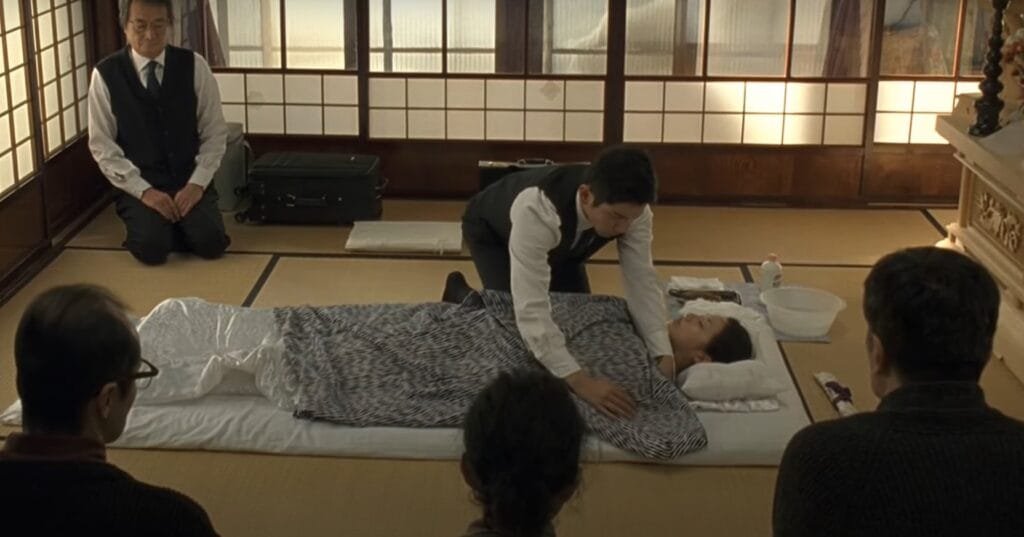Departures is a 2008 Japanese movie. The movie narrates the life of a failed cellist becoming a mortician. And the prejudice surrounding the profession. Takita Yojiro started his career as a director in the porn industry. In particular directing a number of entries in the saga Molester’s Train. And he directed Departures as a way to make a movie about “a thing that is universal to humankind and still discriminated against”. Departures went on to win an Oscar for Best Foreign Language Film. A first for a Japanese movie since the award is official. It’s a must see. For cinema lovers. For Japanese culture lovers. But Everyone.

Departures and The Diary of a Coffinman
Departures’ protagonist Motoki Masahiro was driven by fate to the film. In the early 90’s he traveled around India together with a Friend. Being only 27 years old he was shocked to have the chance to attend a funeral ceremony in Varanasi, at the Ganges’s shore. His friend and travel companion recommended him to read Memento Mori just before the trip. The book by Japanese photographer Fujiwara Shinya which in Latin means “remember you’ll die”.
He returned to Japan with a new interest in the death rituals. It was then when he came across The Diary of a Coffinman. Shinmok Aoki’s autobiographical book about his time as a Budhhist Mortician. Showing a different way to handle the body in comparison to the funeral on the Ganges. The preparation of the body. And the care of the mortician to capture the life of a person in those last seconds. Motoki Masahiro said “I’ve found a sense of mystery and even eroticism to the profession in the pages of The Diary of a Coffinman”
The director and his relation with eroticism
Departures’ director Takita Yojiro started his career as a pink film/porn director. After his career with the eroticism of sex in the cinema he made Departures interested in “show the perspective of a man dealing with something common to all of us but still getting discriminated against”. The analogy with his early times as a director is my opinion and nothing he’s expressed. But cannot avoid thinking that dealing with the sex film cinema was part of a path to illustrate a mortician’s struggle with discrimination. Making a mortician become a Burakumin. A taboo against people that sometimes tarduces as non-living humans. Making them fall out of Japanese society. Even with Yakuza recluting them as prospects sometimes
That is the motor of Departures. How the protagonist deals with discrimination from childhood friends and even his wife. Making the taboo clash with the beauty and honor inherent in the profession of a Budhhist mortician. But maybe only a Japanese film about death can become a work of beauty.
The Cellist and The Mortician Metaphor
Departures has another beautiful mind helping to make it a classic. Legendary composer Hisaishi Joe wrote the soundtrack for the movie. The same that created the music for Laputa: Castle in the Sky and other Miyazaki Hayao’s works. Director Takita Yojiro asked Hisaishi to create a soundtrack to idealize the broken relation between the protagonist and his father. And center the emotion about the cello. As the protagonist sees his own dream of becoming a cellist broken as a kick start for his new way of life.
The score was played during shooting to help with the mood of the actors. Takita said “The cello has a human shape. The cellist embraces the cold wood when playing. In a loving way. Same way a mortician does”.